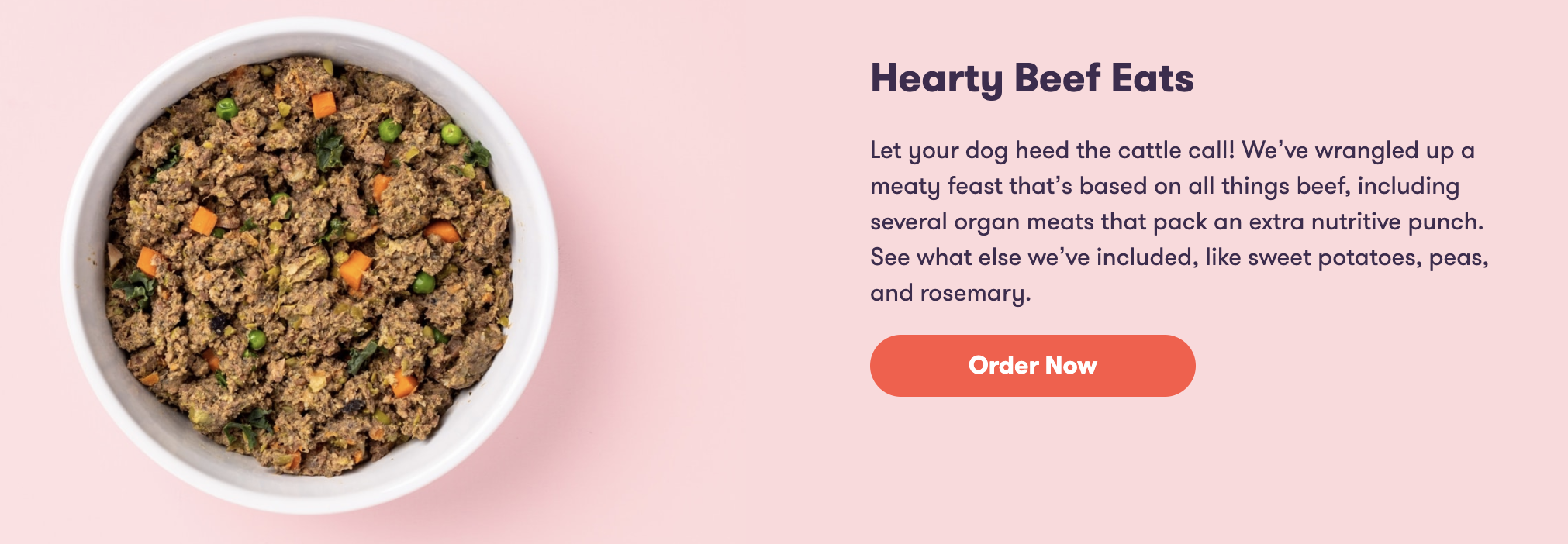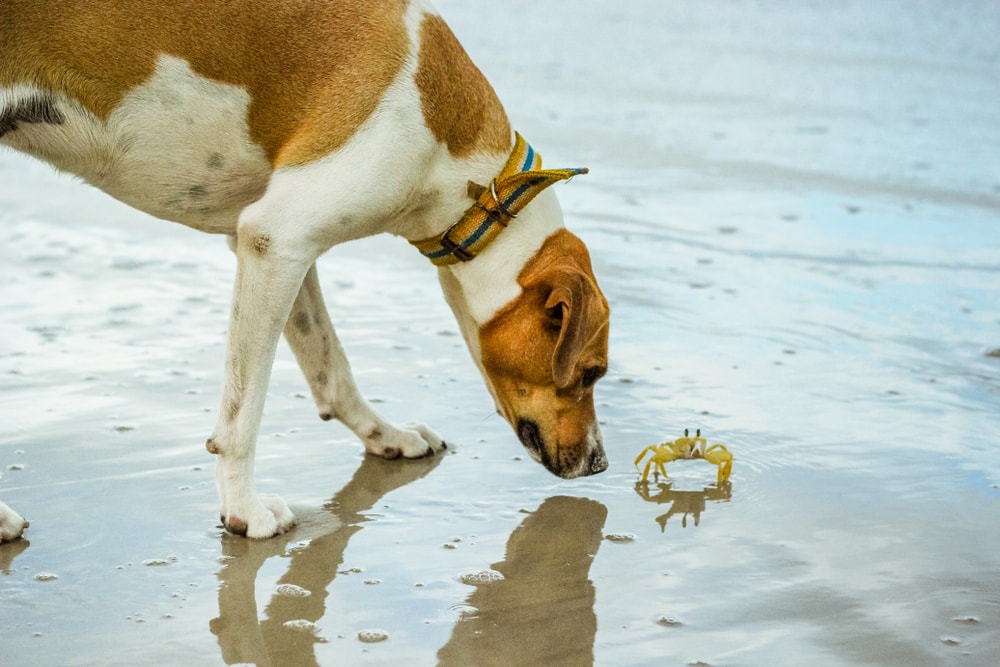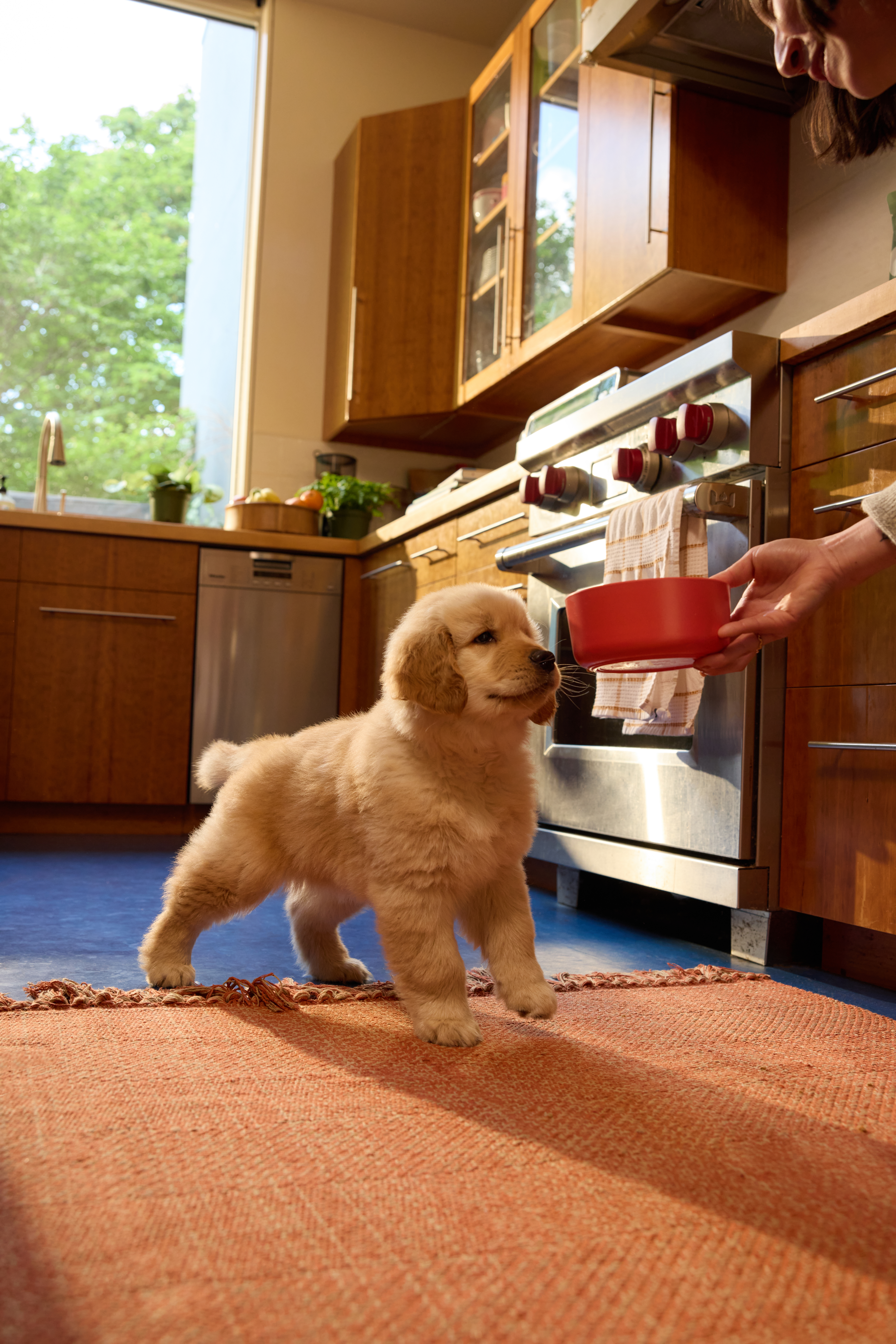Hey Ollie blog readers! We’re offering you an exclusive 60% OFF your starter box! Try now!
Got leftover crab and thinking of sharing with your dog? Before you do, it’s important to ask: Can dogs eat crab safely? While real crab meat isn’t toxic to dogs, it can cause issues like allergies, stomach upset, or even salt poisoning if not handled carefully. And imitation crab? That’s a bigger red flag. Let’s break down the facts so you can decide what’s best for your pup’s health.
Can Dogs Eat Crab Meat?
Technically, yes. Crab is not a toxic food for dogs, and in many cases it can be a healthy treat for your pup. Crab meat is a lean protein, the most important component of a dog’s healthy diet. Additionally, crab contains vitamins and minerals that are essential for dogs, including vitamin B12 and the mineral, zinc. Vitamin B12 encourages healthy brain function in dogs, while zinc helps to regulate metabolism. Like many seafoods, crab is also a source of omega-3 fatty acids, which helps with kidney function, while warding off heart disease, and makes a dog’s skin moisturized and his coat shiny.
Is Crab Safe For Dogs?
Crab meat can be safe for dogs—in small amounts and when cooked properly. But it comes with some risks.
According to PetMD, real crab isn’t toxic to dogs, but certain parts of the crab and how it’s prepared can cause problems. Raw crab may carry parasites or bacteria that could lead to gastrointestinal issues. And crab shells? Definitely a no-go. They’re sharp and hard to digest, which can lead to choking or internal damage.
Even cooked crab meat can trigger allergies in some dogs. Shellfish allergies in dogs aren’t uncommon, and symptoms may include itching, vomiting, or diarrhea. If your dog has never eaten crab before, start with a very small amount and watch closely.
Important: Imitation crab (also known as surimi) is not safe. It often contains additives, preservatives, high levels of sodium, and even artificial sweeteners like xylitol, which is toxic to dogs.
Bottom line: Crab meat is only safe for dogs if it’s fresh, fully cooked, and served plain—no butter, seasoning, or shell.
Is Crab Good For Dogs?
Crab has some nutritional benefits for dogs, but it’s not a superfood. If your dog isn’t allergic, a small bite now and then can be okay.
Crab is rich in protein, which supports muscle health and energy. It also contains vitamin B12, important for brain function and red blood cell production, and zinc, which supports the immune system and skin health.
However, there are better protein sources for dogs that don’t come with the same risks. At Ollie, we use high-quality meats like chicken, beef, lamb, and turkey in our fresh and baked recipes. These are easier on your dog’s digestive system and provide complete, balanced nutrition.
Quick Note: Crab is also high in sodium and cholesterol, two things most dogs don’t need more of. Feeding too much crab, even if cooked, could lead to salt poisoning or digestive upset.
So, is crab good for dogs? It’s okay as an occasional treat, but not something to add to their regular diet.
Risks of Crab Meat for Dogs
That live crab on the dog beach might be fun for your dog to chase, but never allow your dog to eat raw crab or crab in the shell. Raw crab often carries intestinal parasites, which can lead to a painful condition for dogs. The shell (either raw or cooked) is very sharp and can easily shard and damage a dog’s gastrointestinal tract, leading to injury (a common sign of such injury is intestinal parasites vomiting blood).

Even shelled, cooked crab poses a danger for dogs. Some dogs are allergic to crab, so it’s important to sample the food in very small portions to prevent an adverse reaction. As with any new food, you want to introduce it gradually to prevent vomiting or diarrhea.
While crab might be okay for your dog in small quantities, it’s not the best choice for an everyday protein. Crab is naturally high in iodine, which dogs may be sensitive too, as well as cholesterol, which can be difficult for dogs to digest. The high sodium content in crab should be monitored closely as too much salt in a dog’s diet can lead to a dangerous electrolyte imbalance.
Can Dogs Eat Imitation Crab Meat?
Imitation crab meat, which isn’t really crab meat at all, but a mix of processed white fish and other additives is not healthy for dogs. While a little bite of imitation crab probably won’t hurt your dog (aka there’s no reason to call poison control), the added sugar, sodium, other additives and binders may make a dog throw up or experience GI distress.
Frequently Asked Questions About Dogs and Crab Meat
Can dogs eat crab meat?
Yes, dogs can eat small amounts of cooked, plain crab meat. Make sure it’s fully cooked, shell-free, and contains no butter, garlic, onions, or seasoning. Avoid imitation crab.
Can dogs have imitation crab meat?
No, dogs should not eat imitation crab. It contains preservatives, high sodium, and artificial ingredients that can upset your dog’s stomach or cause long-term health issues.
Is crab bad for dogs with allergies?
It can be. Some dogs are allergic to shellfish, including crab. Signs of a crab allergy include itching, vomiting, diarrhea, or swelling. If it’s your dog’s first time trying crab, monitor closely and call your vet if symptoms appear.
How much crab can a dog eat?
If your dog tolerates crab, a small bite or two is enough. It should be an occasional treat, not part of your dog’s daily diet. Too much crab can lead to digestive upset or salt poisoning.
Can dogs eat raw crab?
No, dogs should never eat raw crab. Raw crab may carry parasites or bacteria that can make your dog sick. Always cook crab thoroughly before serving it to your dog.
What should I do if my dog ate crab shells?
Crab shells are dangerous and can cause choking or intestinal blockage. If your dog swallows crab shell pieces, call your vet right away, even if they seem fine. Symptoms like gagging, vomiting, or abdominal pain could appear hours later.
Are there safer seafood options for dogs?
Yes. Cooked fish like salmon (without seasoning or bones) is often safer and healthier than crab. It provides omega-3 fatty acids, which support skin, coat, and heart health. Still, moderation is key with any seafood.
The Ollie blog is devoted to helping pet parents lead healthier lives with their pups. If you want to learn more about our fresh, human-grade food, check out MyOllie.com.
Tagged As:

The nutrition your dog needs,
the food they want.

Enjoying our articles? Subscribe our Newsletters and get new articles directly to your inbox
You might also like
17 October 2025
6 MINS READ
Choosing the Best Food to Fuel Your Puppy’s Strong Future
As a new pup parent, you have the responsibility of laying the foundation for your puppy’s future health. The nutritional choices you make during their first year are crucial, directly influenci…
by Ollie Pets
17 October 2025
3 MINS READ
Gentle Human-Grade Solutions for Sensitive Stomachs
Watching your dog suffer from a sensitive stomach is always stressful, and the constant worry about gas, loose stools, or vomiting can be overwhelming. Fortunately, a high-quality, easily digestib…
by Ollie Pets
17 October 2025
5 MINS READ
Choose Fresh: The Best Dog Food for Allergy Relief
As a pup parent, there’s nothing worse than seeing your dog in distress. The constant scratching, irritated skin, or upset stomach that comes with allergies can be heartbreaking. The good news is …
by Ollie Pets







